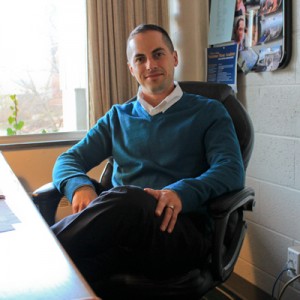Thomas Kline, director of music admissions and preparatory programs, returned from the U.S.A. Schools of Music Asia audition tour in November and is seeing an increase in interest on the part of international students to study at the School of Music.

Over the course of four weeks, Kline traveled to Seoul, Taipei, Hong Kong, Bangkok, Singapore, Gonzo, Shanghai and Beijing to recruit international students to apply to the School of Music. Kline traveled with four representatives from Oberlin Conservatory, Boston University, Manhattan School of Music and Peabody Institute.
The panel attended auditions of 400 prospective students from instrumental and vocal backgrounds who were hoping to apply to the Ithaca College School of Music. Kline said the trip is expected to increase the number of international students at the college, adding to the cultural diversity of the School of Music.
Assistant News Editor Sabrina Knight spoke with Kline to discuss the effects of the recruitment trip on the college’s music program.
Sabrina Knight: What were some of the things you did in Asia?
Thomas Kline: Of the four weeks, there were many audition days in the different cities. I think we had four free days over the four weeks, which is not a lot, but we tried to make the most of it. I blogged about most of our free days, and then there were a lot of travel days, so a day to travel in between each city, which can always be interesting depending on if the flight is on time and getting to the airport and getting to where you need to be.
SK: How do you think this trip will encourage international students to apply to the college?
TK: We’ve been on this trip for two years. This is our third year, and over the last two years we’ve seen international applications rise by 600 percent, and we’ve seen [the School of Music’s] international percentage of students rise up from 0.5 percent up to 5 percent of our student body, which is very encouraging. This past year we brought in 18 international students, 14 from China and four were from Southeast Asia. The diversity that they’ve brought and the talent to the School of Music has just been really notable and I think encouraging. I know that those applications and students who enroll are in direct result of the trip, so it’s been very instrumental in supporting that.
SK: What have you learned from your trip that could alter programs in Ithaca?
TK: We have — and I think one of the benefits of this — is that we’ve had to learn to accommodate international students within the School of Music, and so because of that we’ve recently started a summer transition program, so these students participated in that over this past summer. It was a two-week program over the summer, where the students took intensive English training as well as cultural immersion and just nuts and bolts: how do you transfer, how do you start a new life halfway across the world, like setting up a bank account and getting apartments set and settled, getting all your school supplies. That was very helpful in getting all the students transitioned into studying in the U.S. We’ve also had some language classes offered here at the school to help support them since they are speaking a foreign language, and I think that’s helpful to them.
SK: Do you see the recruitment trip having a direct effect on IC 20/20?
TK: I do, and part of IC 20/20 is to increase the percentage of international students and to develop a China Center, so I think the relationships that we’ve built in China and internationally will directly support IC 20/20 … Since we started, we were relatively unknown in China three years ago, and now I feel like when I meet students or parents or teachers, they’ve heard of Ithaca, and some of them know students who attend Ithaca.
SK: How are you expanding your international recruitment?
TK: Well it’s a multi-pronged approach. The first thing is the audition tour … That’s the first approach. However, you need to create demand for students to want to apply to Ithaca after that, and the way to do that is through faculty travel to many of those locations. So we have been fortunate that the college is supported over the past two years, sending faculty members to the International Piano and Violin competition in Beijing. We saw a direct increase with students wanting to study. So whoever participated in that wanted to study with those professors. Faculty involvement in teaching and just being present in those areas makes a big difference.







